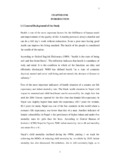Please use this identifier to cite or link to this item:
https://elibrary.tucl.edu.np/handle/123456789/3567| Title: | A Study on Maternal and Child Health Care Practices of Dhupoo VDC, Shankhuwa Sava District |
| Authors: | Panta, Raj Kumar |
| Keywords: | Child Health Care;Care Practices;Maternal;Child immunization |
| Issue Date: | 2011 |
| Publisher: | Faculty of Education |
| Level: | Masters |
| Abstract: | The study, “Maternal and Child Health Care Practices: A Study below of 5 years child in Dhupoo VDC, Shankhuwa Sava District" has been carried out to assess the health care practices of a rural area of Nepal. It tries to find out the socioeconomic and demographic characteristics; to assess the antenatal care, delivery and postnatal care practices; and to examine the practice of colostrums feeding, breastfeeding, child immunization, and additional food feeding by rural women. A total of 120 respondent mothers were interviewed on maternal and child health care, and 36 respondents were taken for focus group discussion. For key informant interview, the chairperson of health post, volunteers, social worker, TBA, etc., were consulted. Therefore population of study area is 120. In the study area, ages of the respondents are between 15-45 years. Among them, 29.16(35) percent women were married at early age (15-20 years), and literacy rate of the women has been found satisfactory. 75% respondents are landless and most of the respondents are housewives. Regarding health care practices, around 90 percent of the respondents were found that they go for health checkup during pregnancy, and 56.86% of the total mothers have taken more than two doses of TT injection during their pregnancy period. The study has confirmed that around 68.33% of the mothers delivered their babies in hospital and 31.67% mothers delivered at their own homes. All of the respondents had fed colostrums and 73.34% respondents have breastfed for more than two years. Overall, although the findings suggest that these practices are satisfactory from a national level point of view, their performance can be said below par if we compare it to other villages. Women's social status, unavailability of infrastructure, weak awareness's transmission along with their low economic and political status as well as their occupations is seen to be responsible for their somewhat low performance on maternal and child health care |
| URI: | http://elibrary.tucl.edu.np/handle/123456789/3567 |
| Appears in Collections: | Health Education |
Files in This Item:
| File | Description | Size | Format | |
|---|---|---|---|---|
| chapter.pdf | 172.96 kB | Adobe PDF |  View/Open | |
| cover.pdf | 30.94 kB | Adobe PDF |  View/Open |
Items in DSpace are protected by copyright, with all rights reserved, unless otherwise indicated.
